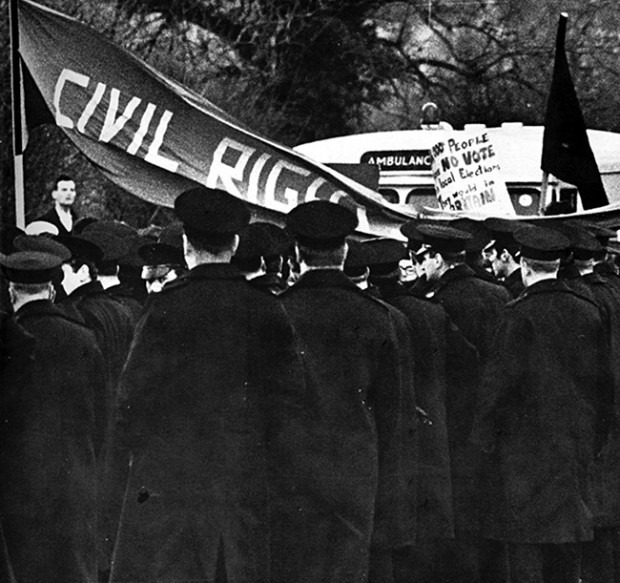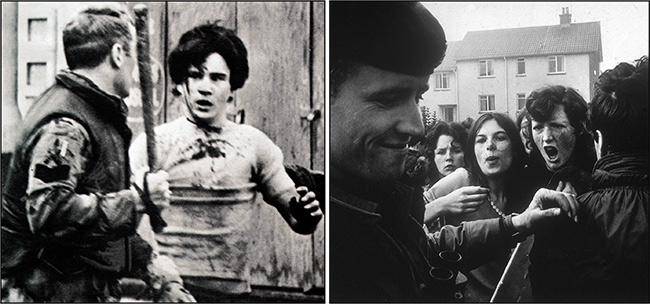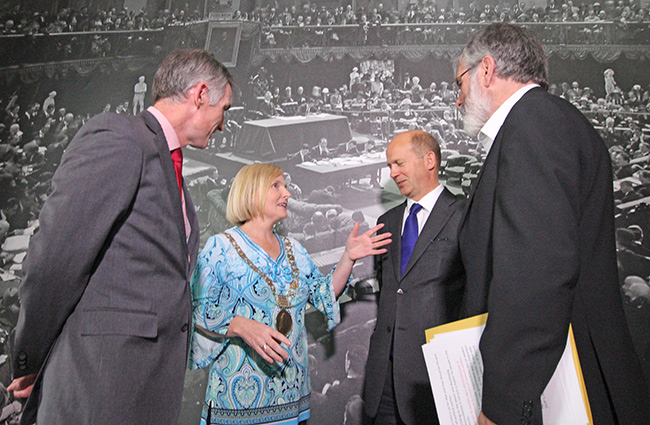1 December 2015 Edition
Understanding the causes of the conflict – Eibhlin Glenholmes
UNCOMFORTABLE CONVERSATIONS

• Exclusion and discrimination against the Catholic minority population created the conditions of conflict
I recall the many dark days as the Northern state sought to silence the campaign for civil rights, inclusion and parity of citizenship
Eibhlin Glenholmes is a member of the Sinn Féin Group on Legacy Matters, Eibhlin writes on the need for unionists to acknowledge the republican conflict experience and on the lack of reciprocation as the missing element in the Uncomfortable Conversations initiative understanding the causes of the conflict.
IN MARCH 2012, Sinn Féin launched Uncomfortable Conversations, an initiative by the party aimed at creating a strategic framework to share the republican experience of the conflict while also seeking to reach out to loyalism and unionism, to civil society, the trade unions and the PSNI, and (as importantly) to engage internally with those who do not subscribe to the republican peace strategy.
Like many republicans, I have early memories of sectarian conflict, growing up as I did in the small Ballymacarret community of east Belfast. I recall the many dark days as the Northern state sought to silence the campaign for civil rights, inclusion and parity of citizenship; the 1969 pogroms; the excessive use of state force; the deployment of the British Army, internment without charge or trial, and a prejudiced and morally bankrupt judiciary. These all combined to bring state conflict and violence to my family, to my community and to myself. That’s my life experience and that of so many of my generation.
Let me be clear – both the Orange and British states were the aggressors.
It was they who created, and sustained, by fear and coercion, their policies and practices of exclusion and discrimination against the Catholic minority population. It was their practices that created the conditions of conflict.
As I have said before – we didn’t go to war; war came to us.
In the dead of night it came to my door and to the doors of my neighbours. It came with an English, Scottish or Welsh accent. It came with an SLR rifle in its hands or it came with a Belfast accent and a balaclava and a handgun. Either way, it came.

• The Northern state sought to silence the campaign for civil rights through the use of force
I say this as I want unionists to understand the impact of living in a state in which republicans were excluded. I want them to understand why I, and so many others, resisted. I want them hear that I am extremely proud of and eternally grateful to those Irish republicans who fought this oppression, exclusion, injustice and state-sponsored murder of my compatriots. I want them to hear that it is hurtful as they seek to dismiss the loss and pain of those killed from within the republican family.
I also want them to hear that I want the same rights, opportunities and prosperity for them and their community that I want for my own. I also want to listen to and engage with their concerns, their hopes and aspirations as we seek to map out a better future.
I want to hear from them why there is a reluctance to examine the root causes – the genesis and aftermath of the conflict the daily court battles by families bereaved through state killings, the use of state agents, the insurmountable evidence around the practice and policy of collusion, shoot to kill and torture. I want to discuss with then the fundamental questions about the British conflict policy in Ireland.

• The British Ambassador takes part in the Uncomfortable Conversations launch in Dublin where he was a key speaker
I want them to understand, acknowledge and appreciate the republican commitment to the Peace Process and building a better future. If there is a true commitment to never revisiting the past then let’s forensically examine why the conflict happened in the first place.
I also want to ask the question why there is no reconciliation strategy or outreach from within unionism to republicans, particularly in the space of the Uncomfortable Conversations forum where those new understandings, new relationships and new possibilities can be forged. Such conversations are the bedrock for building a better future.
The historic and pragmatic compromise at the core of the Good Friday Agreement process created political processes through which all political aspirations can be democratically pursued.
There is a small number of militarist factions who reject Sinn Féin’s peace strategy while offering no alternative political programmes, strategy or viable way forward. Yet their existence alone serves as a reminder as to why they too must be invited to engage and participate in the Uncomfortable Conversations initiative.
This is the time for brave engagements and to be heard. This is the time to show humility. This is the time to acknowledge the pain, hurt and loss that flowed from the conflict.
Uncomfortable as it will be, we all must learn together from the collective mistakes of the past. This means extending the invitation and seeking out the unheard voices. It means being brave and appreciating the transformative potential of the space Uncomfortable Conversation offers everyone to define the new understandings and build new relationships that will underpin the peace.




